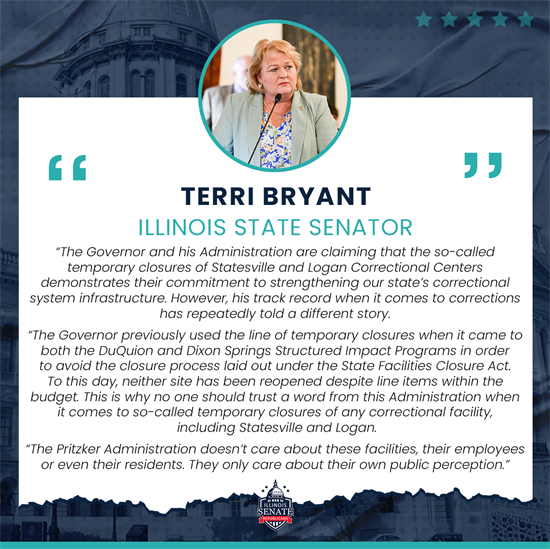New Legislation Aimed at Helping Struggling Families
New financial help could soon be available for parents thanks to legislation designed to provide financial relief to families with children enrolled in daycare and pre-K programs.
State Senators Sue Rezin (R-Morris) and Jil Tracy (R-Quincy) have filed legislation to enact new state tax credits to help offset some of the costs that parents incur for both preschool and childcare. The two Senators called for action on their legislation at a State Capitol press conference on March 21.
“Any parent or guardian of a young child will tell you that one of the greatest financial hardships that growing families face is the lack of access to affordable, high-quality preschool and childcare,” said Sen. Rezin. “It is time for our state to ease some of that financial burden that has fallen upon parents and ensure that every child has a chance to access much-needed preschool education.”
Sen. Rezin’s Senate Bill 2717 would allow parents or guardians of one or more children between the ages of 3 and 5 who attend an eligible preschool program in Illinois to qualify for a tax credit equal to 100 percent of the expenses they incur to send their children to that preschool program, up to $1,500 per child.
Sen. Tracy is sponsoring Senate Bill 3104, which would give parents a state tax credit for each qualifying child on their income taxes to help provide financial relief for those paying for childcare services. Under the proposal, qualifying families would receive a state tax credit equal to 25 percent of the current federal childcare tax credit for each child.
“Families throughout Illinois are finding it difficult to make ends meet as high inflation and other economic pressures impact their bottom line. Republican Senators have long been advocates for different plans to lessen the tax burden on Illinoisans,” Sen. Tracy said. “Today, we are renewing our call to provide much-needed relief for Illinoisans who are struggling to keep up with the state’s high cost of living.”
As the spring legislative session continues, Senate Republicans hope to see bipartisan progress on these critical issues to improve the lives of people of all ages and in all stages of life who call Illinois home.
State Senator Terri Bryant says it is important to support growing families and help provide children and their parents with the best opportunities possible.
Legislators Critical of Two Correctional Facilities Closing
The Governor recently announced his plan to close and rebuild Stateville Correctional Center in Will County and Logan Correctional Center in Lincoln, leaving many unanswered questions about what will happen to the current employees, inmates, and the local communities.
In February, the Governor proposed $900 million for maintenance and modernization of Department of Corrections facilities within his proposed FY25 budget. In the joint prison closure announcement from the Governor and the Illinois Department of Corrections, it became clear that the money was meant to be used to demolish and rebuild Logan and Stateville.
Currently, the Governor is planning to rebuild Stateville at the same location as the current facility, but his administration has released no details or commitments on the location of the new Logan Correctional Center. This lack of commitment drew scrutiny from locally elected officials, including State Senator Sally Turner (R-Beason), State Representative Bill Hauter (R-Morton), Logan County Board Chairman Emily Davenport, and Lincoln Mayor Tracy Welch.
They expressed concerns about what would happen to the more than 500 direct jobs, hundreds more indirect jobs, and economic benefits that Logan Correctional Center provides. While they recognized a need for repairs, they rightly pointed out that the facilities’ current state of disrepair exists because of administrative neglect and misplaced priorities.
Meanwhile, the local union representing the two facilities came out against the plan citing fears that even temporary closures of the centers would “disrupt and potentially destabilize the prison system, while bringing upheaval to the lives of affected employees and individuals in custody.”
In accordance with the Commission on Government Forecasting and Accountability process, construction of new facilities will not commence until all requirements of the State Facilities Closure Act are met. More information about that process, including a timeline, can be found here.

Developmental Disabilities Awareness Month
To raise awareness for the challenges people with disabilities face, March has been designated as Developmental Disabilities Awareness Month.
Intellectual disabilities (ID) or developmental disabilities (DD) affect a family member in one out of 10 families. Intellectual, neurological, and physical impairments, vision and hearing loss are all examples of the wide range of conditions encompassed by the term developmental disability.
Access to disability services and resources are given to people after they are assessed by local agencies and the Division of Developmental Disabilities (DDD). The largest area of support for these residents comes from the DDD and the Illinois Department of Human Services (IDHS).
Around 32,00 residents are supported by IDHS and DDD, but due to inadequacies in services and funding, the state currently has almost 16,000 individuals on a waiting list for the services these organizations provide.
These issues have grown considerably more apparent after a Guidehouse report revealed that the state has underfunded the DD community by half a billion dollars over the last five years. Meanwhile, the Governor’s recent budget proposal once again fails to meet recommended funding levels, but prioritizes a billion dollars for non-citizen programs.
EPA Funding Opportunities for Watershed Management Projects to Address Pollution

When rain or snowmelt carries human-made pollutants into bodies of water, it leads to what is called nonpoint source pollution, which is a major pollution concern nationwide. The Illinois Environmental Protection Agency (IEPA) is working to reduce this type of pollution through two new grant programs. The programs have a total of $4.75 million in funding available for watershed-based planning and implementation project proposals.
According to the IEPA, projects need to be aimed at reducing, preventing, and eliminating Illinois surface and groundwater quality impairments. IEPA is targeting the grants at local governments, with the goal of protecting water quality in their municipalities. This program will accept applications from March 13 to May 1. Applications can be found at https://grants.illinois.gov/portal/

